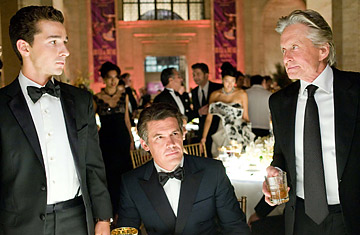
From left, Shia LaBeouf, Josh Brolin and Michael Douglas in Oliver Stone's sequel Wall Street: Money Never Sleeps
On Monday, at President Obama's CNBC town-hall meeting, one of his sharpest critics was a Harvard Law School classmate and current hedge-fund boss, Anthony Scaramucci. "I represent the Wall Street community," he said, as if he'd been elected in a vote of downtown billionaires. "We have felt like a piñata. Maybe you don't feel like you're whackin' us with a stick, but we certainly feel like we've been whacked with a stick. When are we [meaning the U.S. government] gonna stop whackin' the Wall Street piñata?"
Aside from the entertainment value of an overeducated, way-too-rich money manager talking like Christopher Moltisanti on The Sopranos, Scaramucci's plaint had an unintended poignancy often found among the morally myopic. What the federal government did, Mr. Scaramucci, was give you and your pals a billion-dollar bailout after you gamed the world financial system close to bankruptcy. Then "the Wall Street community" went on doing business the same rapacious way, making risky bets and refusing loans to people who needed them. You were the guys with the stick; it's America's investors and homeowners who got whacked.
Say this for Wall Street: Money Never Sleeps, Oliver Stone's sequel to his 1987 fable of institutionalized greed: none of the sharks in this pool whine over a little spilled blood. They bend the rules, knead the dough and shiv one another with the competitive grin or grimace of filthy-rich 25-year-olds at a lunchtime racquetball session. Scoring on Wall Street, and in both Wall Street movies, is, as the films' predator-in-chief Gordon Gekko says, "not about the money. It's about the game." Think of the financial-services industry as the NFL — a hard-contact sport — except that it's the folks in the stands, not the players, who can get their heads knocked off.
At the beginning of Money Never Sleeps, Gekko (Michael Douglas again) leaves prison, where he'd been sent for mischief committed in the original film, just in time to see his spiritual offspring manipulate world currency with a toxic grandeur Gekko only dreamed of. And again he has a slightly more principled young striver — Shia LaBeouf, the next-generation Charlie Sheen — primed for a master's instruction and destruction. Moving as fast and recklessly as a trillion-dollar fat-finger stock-market transaction, the film has the drive, luxe and sarcastic wit of the snazziest Hollywood movies for most of its two-hours-plus running time. Only at the end does it go soft and sweet, like the candy inside a piñata.
Set mostly in 2008, just before the autumn stock-market crash and its revelation of industry-wide felonies, Money Never Sleeps is also a parable of sons trying to learn from the triumphs and sins of their fathers. That makes it personal to the three gents at the core of both movies: to Stone, who dedicated the original film to his stockbroker father Lou; to producer Edward Pressman, whose stepfather was a Manhattan banker; and to Douglas, whose career can be seen as a struggle to balance the legacy of his movie-icon dad, the majestically feral Kirk, with his own more modulated top-dog persona.
Stone's original exposé of the financial world lucked into a historical moment: it opened two months after the Black Monday stock-market crash. But it might have quickly faded from notoriety to anonymity if the director and writer Stanley Weiser hadn't invented that black knight of finance, Gordon Gekko — and if Douglas, borrowing some of the pile-driving charm from his dad's early gangster roles, hadn't invested the character with such reptilian brio, such pleasure in playing the game and gaming the system. Strutting his boardroom machismo, he expectorated such lasting aphorisms as "Lunch is for wimps," "What's worth doing is worth doing for money," "If you need a friend, get a dog" and "Greed ... is good, greed is right, greed works." Gekko was a monster out of Jacobean satire, yet he connived with so much gusto that the creature became a role model for financial go-getting. If the investment sector needed a patron saint of killer rapacity as it clawed its way to record profits and stranglehold power in the middle years of the past decade, Gekko was it.
